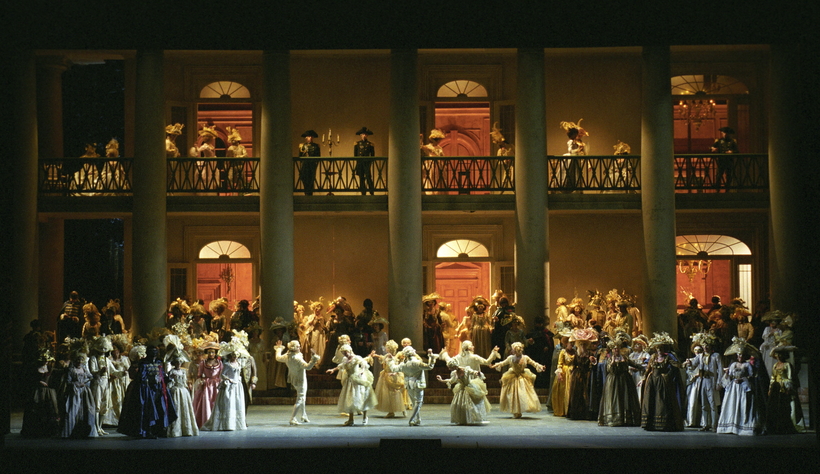As conceived, Un Ballo In Maschera was meant to dramatize the assassination of Sweden’s enlightened despot Gustav III at the Royal Opera House in Stockholm. Daniel Auber’s opulent treatment of the same subject had taken Paris by storm in 1833, but in Italy, onstage regicide was taboo, and the censors refused to give an inch. And so, for Verdi’s purposes, the Nordic monarch was downgraded to Riccardo, Earl of Warwick, the British governor of pre-Revolutionary Boston.
It’s an innocent fantasy that does no harm. The more you read up on Gustav, who almost certainly was gay, the less sense he makes as the apex of the libretto’s heteronormative love triangle of ruler, right-hand man, and right-hand man’s wife. Occasional attempts are made to restore the original plan, but who goes to the opera for a history lesson? Liliana Cavani’s sober mise-en-scène, documented at the Teatro alla Scala, Milan, in 2001, preserves the nominal New England locale in a vintage cinematic style fashionable houses have all but abandoned.
The truths in Verdi’s musical tapestry of forbidden passion, betrayal, and revenge are not site-specific but poetic, sweeping us from the glitter of the court to the foot of the gallows and then back to the palace dance floor, where long-festering conspiracy erupts in murder.

The music that propels the story is a marvel, forever tipping from rapture to menace, from sneering jest to deadly earnest, from darkest gloom to sparkling artifice. In Riccardo Muti’s hands, it unfurls like the most luxurious of changing taffetas, holding the imagination in thrall from first note to last. For swirling emotion, check out the quintet for three murderous malcontents, a wife stifling her panic, and a pageboy all but turning cartwheels in anticipation of a party. If you want to know what makes Muti Verdi’s supreme living interpreter, here’s a chance to find out in three minutes.
For many, the tenor in Un Ballo In Maschera stands out as the most appealing hero in the Verdi canon: brimming with youthful vitality and idealism, magnanimous to a fault, susceptible to beauty yet swayed by honor, and not only his own. His avatar here is Salvatore Licitra, an artist of sunny temperament and lusty tone who in the year of his 30th birthday hopped, skipped, and jumped from nowhere (the two-man graphics studio he started with his brother) straight to the top of his profession.
A season after Licitra’s professional debut in Parma in this very opera, Muti took him under his wing at La Scala. Soon after, the tenor chalked up his New York debut at the Richard Tucker Opera Gala on November 11, the smoke of 9/11 still in his nostrils. Six months later, the Met parachuted him in to sub for Luciano Pavarotti in Tosca, triggering pandemonium. Nine years later, the music came to an abrupt end when he lost control of his motor scooter on a road in Catania. Nine days after that, he was gone at the age of 43. What a joy to meet him again in the role that launched him.
Un Ballo in Maschera is available for streaming on medici.tv
Matthew Gurewitsch writes about opera and classical music for AIR MAIL. He lives in Hawaii

